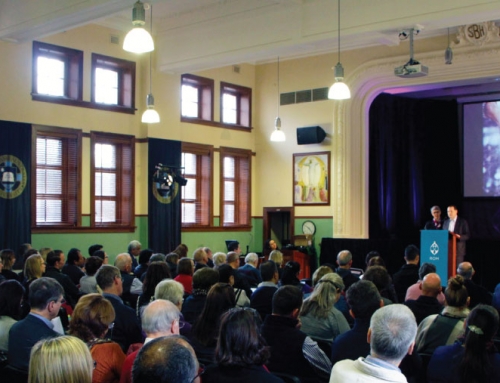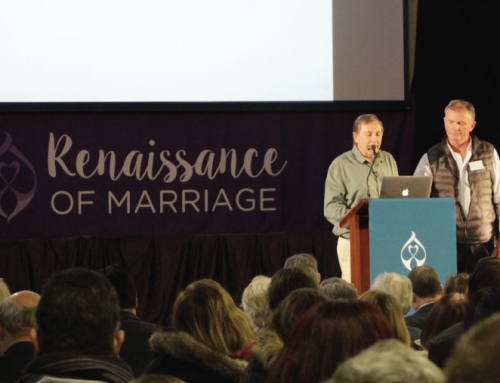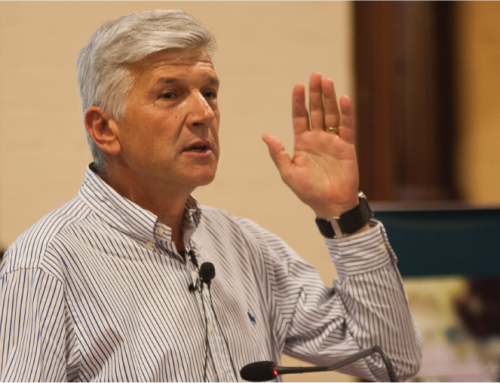Opening Talk, Impact 1, Francine and Byron Pirola
MARRIAGE HAS NEVER BEEN MORE TOPICAL…
and the living witness of good marriages never more needed. We have a teachable moment both within the Church and as a Church to bring good news to the world. We are called to grasp this challenge. Byron and Francine will draw on some 25 years of work with married couples to frame why a ‘Renaissance of Marriage’ is both needed and possible.
Download Full script here
View the Transcript
Opening Address
We have been working for and in marriage for close to 30 years. It’s a hard mission. It is the vocational state in which most adults spend the majority of their life, it is the heart of the family, couples say their marriage is their most important thing in life and the Church identifies it as a vocational Sacrament.
You would think that people would care deeply about marriage, about their marriage. But by and large we do not. Ask couples “what have you done for your marriage today” and you mostly get blank looks.
Ask church and public policy makers what policies have been introduced to support successful marriages and you get referred to counselling services and family court services. We are great picking up the casualties at the bottom of the cliff but we do very little at the top of the cliff with few notable exceptions such as the then Minister Andrews initative of the The Stronger Relationships Trial.
At the societal level, marriage – and family life that depends on it, it’s a bit like maintaining a car, or our roads or bridges… they can all be allowed to decaye and be neglected for years with minimal obvious effect. And then one day we find ourselves in a mess. A mess that takes real investment to fix.
It’s the same too at a personal level. The vast majority of marriages that end in divorce are not mired by domestic violence, deep conflict or irreconcilable differences. They just drift into indifference. They don’t blow up through some calamity, they just break-down gradually through a lack of care and maintenance, which makes them vulnerable to any bump in the road.
A glass half full
So why are we hopeful about marriage? Why are we not chronically depressed?
- Well, ironically for the first time everyone wants to talk about marriage… it may be for the wrong reasons but none-the-less it’s a teachable moment.
- Everyone wants to lay claim to marriage, again for dubious reasons… but it’s a teachable moment.
- We know the basic truth of marriage… that a man and woman in a committed lifelong relationship and open to life are both Sacramentally and naturally evangelising… it makes visible the invisible presence and reality of God
- We can complain about all this and indeed it can feel like dark days… but at the same time for the first time marriage is on everyone’s agenda.
This presents us with an unprecedented teachable moment and as a Church we need to grasp the opportunity. We need to lead a new enlightenment about marriage. A Renaissance.
As a Church we can preach all we like about the theology of marriage. We can get caught up in the legalism of valid marriages and communion for the divorced and remarried. These are all important… BUT… at the end of the day unless the world looks at Catholic married couples and says… “I may not understand those Catholics… but I want what they have” then our finest teachings fail to inspire holiness among our own and will fail to evangelise those beyond.
The sacramental gift of the married is to bring make visible to the world the incarnational intimacy of our loving God. A God who loves us passionately and urgently.
This is the gift of married love and the calling of all Catholic married couples.
The mystery of marriage is grounded in its complementarity. A man falls in love with a woman, and a woman with the man. Their love becomes so intense they cannot conceive of not spending the rest of their life together. Their love becomes so deep it goes beyond words and takes on a physical expression where they literally make Love; not just speak words of love but manifest Love through their total self-giving. Their love becomes so intense that it often expands beyond the two of them to manifest a child: a new human being who will be loved by God and known by the name chosen by it’s parents for all eternity
This whole thing is a mystery, it is exciting, it is dangerous, it is Godly. In the Catholic tradition, we have recognised the sacramentality of this mystery. That by the very way a couple loves they make visible the invisible presence of God, they manifest the reality of God.
Married love particularly reveals the intimate, incarnate, urgent and passionate dimension of God’s love. Married love is passionate love, it is erotic love. We read about it in the Song of Songs, scripture that was considered too risqué for seminarians and monks in the middle ages.
Without the sacramental witness of married love the Church’s understanding of God’s love is at risk of being seen as more legalistic than relational, more judgemental than merciful.
Opportunity to be grasped
I spend my life in corporate strategy. Interestingly, if you took a corporate strategist’s view of the situation you would excited; really excited.
Here are the simple facts:
- People are still marrying in high and growing numbers
- Almost all of them at the time of the wedding ambition for it to be lifelong: they don’t marry planning to end it in divorce.
- Most of those who do divorce, admit it was their preferred outcome. It may have been necessary, but it is rarely, if ever, celebrated.
- By and large, all couples fear divorce, it costs at every level
- As a Church, we know more about, and care more about, marriage than almost any other organisation
- We have access to more research-based insight on what it takes to live a successful marriage than in any time in history.
- And yet… in western culture – it has never been more difficult to have a successful marriage
Combined these factors lead to a fantastic opportunity for the Church. There is demand, felt need, fear of failure. All the ingredients one needs to engage with people on this crucial topic
Our failure is that we have systematically neglected to speak into this opportunity, we have failed to grasp the challenge.
Failure is indeed bitterly disappointing… but it is somewhat inevitable in taking on enormous challenges. Giving up is not acceptable. Not trying in the first place is not acceptable. We are reminded of Thomas Edison: when asked was he ever discouraged about his first 1800 failed attempts to invent a light bulb. To which he answered, “not at all: I discovered 1800 ways not to invent a light bulb”.
We are reminded if Winston Churchills famous short speech to the students of Harrow in 1941: “Never, never, in nothing great or small, large or petty, never give in except to convictions of honour and good sense. Never yield to force; never yield to the apparently overwhelming might of the enemy”.
We draw encouragement from the thought of the disciples cowering behind locked doors following the crucifixion of the Lord. It does always indeed seem darkest before dawn.
If our society needs one thing right now it is the healing and holy understanding of human sexuality. What it means at its most basic and most intimate level, what it means to be man and woman in love. What it means to love unconditionally, what it means to be accepted and loved in the full knowledge of each other’s failures.
This is why the work we collectively do is so important. Through your different works you are helping marriages be more successful and more enduring, and in doing so we enable couples to be better living witnesses and literally the ‘hands and heart of God’ in their communities.
We would venture that there is more innovation in this room than any other gathering on this topic in Australia.
This is not a meeting of the theorists. This is a meeting of practitioners, of experimenters of innovators. Not of dealing with just the outcomes of failed marriage, but rather those focussed on building the success of marriage.
This work takes many forms; formation before marriage – be it remote, proximate or immediate – and formation after marriage – both enrichment and support.
Your work has never been more needed. The gift and vision of matrimony has never been more needed by the world in which we live. Marriage and the families that arise from them are the most powerful and urgently needed evangelising force in our world
Empowerment as a 5th stage of formation
We would like to open this conference with two propositions for us to consider.
The first is that “Empowerment needs to be recognised as the missing 5th stage of marriage formation”.
In our traditional thinking of marriage formation in the church we most often talk about four stages, remote, proximate and immediate formation before marriage, and enrichment after. We have a sophisticated understanding that marriage formation starts from the day we are born and move through a number of phases and we have, through our schools and marriage preparation programs built resources to support this. We Catholics are the only organisation of scale to require formal marriage preparation and have done so for decades… and many here have the scars to prove it J.
The fourth stage, enrichment, recognises that marriage formation does not stop on the wedding day. In fact most marriage formation occurs in our marriages. Francine an I have been married together longer than either of us lived before marriage. Needless to say, the formation journey we have been on as a couple in our 28 years leaves the few of years of dating and the one weekend marriage prep course in the dust. Yes we benefited from the twenty or so years of remote and some years of proximate and immediate formation but that is only a fraction compared to our 28 years of intense formation while married.
We don’t do this fourth stage too well. We would argue that no more than two thousand of the 2 million Catholic married adults will attended some form of marriage formation this year. That’s less than 0.1%. I believe the numbers would be even less for non-Catholics. If we serviced our cars at this rate we would be walking everywhere!
But our proposition today is that we need to go further than just enrichment. We need to recognise and develop a fifth stage: what we call empowerment.
Empowerment takes couples from being merely focused on their immediate family to being about the redemption of the entire community. It takes us from being a good, solid loving couple, to being an intentional and active agent, aware of their prophetic calling to not just be members of the church, but leaders of it. It takes us from being merely married, to being ‘matrimonied’ – fully conscious and committed in living out our life in radical testimony to the reality of God’s living presence.
Matrimonied couples see their marriage not as a private relationship but as a public one. They wilfully love each other not just because the feel like it or they are honouring their vows to each other – but also because they realise they have a public commitment to their community to be a loving presence of Christ through their marriage.
Matrimonied couples bring to the Church a unique perspective to the many challenges we face as a community and as an organisation. Matrimonied couples provide for the theologians and bishops distinct and powerful insights into the ways to approach some of the trickiest questions we as a community are facing today. Questions like the worthy reception of communion, often discussed in the context of the divorced and remarried, to questions like healing sexual brokenness, through to whether the priest should say mass ‘ad orientum’.
It is only through a deliberate and conscious process of empowerment will we as Church develop this prophetic role of Matrimony. And it’s never been more necessary.
Marriage is a sexual sacrament
The second proposition we want to put to you is that we truly come to recognise that the distinctive essence of the sacrament is matrimony is its sexual nature… and not that it is a sacrament that also includes sex (perhaps sometimes more than just occasionally).
Mavis and Ron Pirola will speak on this later in the program.
What makes marriage unique of all sacraments and from all other human relationships is its sexual nature. Sex is holy, it is a total self-donation… we make love. We can talk about it, we can theologise about, but at the end of the day, only married couples can make it! Despite the confused and over-eroticised culture we still use those words because they are an accurate description.
These are not just nice words. Our sacramental act is making love and in this act we provide the most profound and closest human witness to the Trinitarian nature of God.
St John wrote in his gospel that God is Love. That the very essence of God, the core identity of God, is Love. If we substituted the word ‘love’ for ‘god’, since God is Love – “making love” becomes, “making God” or ‘God making’. Now we perhaps better understand the sacredness of this act. An act that encompasses our participation in the divine act of creating new life.
While the culture takes a reductionist and profane attitude to sex, the Church sees it for all its glory and proclaims: WOW!
The Catholic faith has the most complete, the most realistic and the most beautiful understanding of marital union, of sex, and yet we still largely treat it as an awkward cousin… we acknowledge it when required but don’t have much to say about it, and have as little to do with it as possible.
What JPII started when he established the Pontifical Council of the Family and penned his Theology of the Body, Benedict progressed and Francis has brought to a grounded reality.
So here is the question for this group to reflect on over the next two days… how do we start to reshape the practical relationship with have with this topic within the Church and beyond the Church. Certainly, we do not need more theology, arguably what we need is a new narrative… and who better that those working with couples, people who understand the theology but live the reality, to lead in this area.
Our kids think all the Church has to say about sex is ‘no’… but they never hear the ‘why’… the ‘why’ is what they need to hear because it is ‘WOW’. And WOW is worth waiting for.
Our couples don’t hear much at all about this topic from the Church even though JPII said that every time we make love we are reconfirming our wedding vows. Makes you think what could happen next time they call for couples to stand and renew their wedding vows in church on a Marriage Sunday! But seriously, what are Catholic married couples called to do other than care for their children and attend to the sacraments. What are the spiritual exercises for the married? [Story from our seminar on spiritual exercises]
We need every married couple to seek to have an enriching sex life; something they priorities as being as important as good verbal communication, and not relegate their love making to something that can only occur when everything is perfect between them, the stars are aligned, the washing is done and the kids are asleep.
Closing
Marriage is not perfect.
So, there are two propositions for us to consider. No doubt others will arise over there two days together.
So, we invite you to use this time together well. To share in our successes, and offer words of encouragement to each other in our related missions. But most importantly, let’s use this time to explore and innovate; to together find new insights and new ways.
We have put two proposals/challenges on the table, let’s add to those and let’s find effective responses to each.
May God bless this time together.






